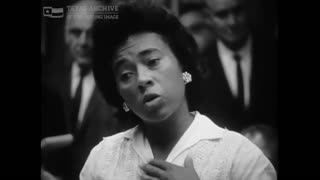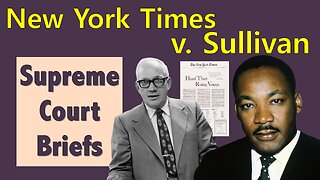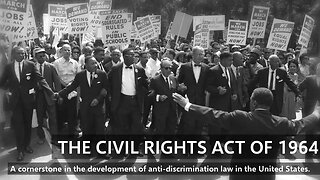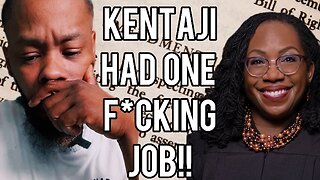How to file a federal civil rights claim by Attorney Steve®
http://www.attorneysteve.com - make sure to SUSBCRIBE to join nearly 40,000 others who love our free legal education videos. Thank you for supporting equal access to justice!!
CIVIL RIGHTS IN AMERICAN HISTORY
The importance of federal civil rights litigation in American history cannot be overstated. For generations, Americans have used the courts to fight for their civil rights and to challenge unjust laws and practices. From the landmark Supreme Court cases of Brown v. Board of Education and Roe v. Wade to the recent cases of Obergefell v. Hodges and Masterpiece Cakeshop v. Colorado Civil Rights Commission, federal civil rights litigations have been instrumental in shaping the American legal landscape.
The history of civil rights litigation in the United States is a long and complex one. In the earliest days of the nation, the federal government was limited in its ability to protect the civil rights of citizens. It was not until after the Civil War that Congress passed the Thirteenth Amendment, which outlawed slavery and involuntary servitude, and the Fourteenth Amendment, which guaranteed citizens equal protection of the law. In the following decades, Congress passed a series of civil rights laws, such as the Civil Rights Act of 1964 and the Voting Rights Act of 1965, that sought to protect the civil rights of African Americans and other minority groups.
Despite these legislative efforts, many states continued to pass laws and regulations that violated the rights of minority groups. Civil rights activists, such as Thurgood Marshall and Martin Luther King Jr., recognized that the courts could be used to challenge these laws and to secure greater protections for civil rights. As a result, civil rights litigations became an important tool for advancing civil rights in the United States.
One of the most influential civil rights cases in American history is Brown v. Board of Education. In 1954, the Supreme Court ruled that the doctrine of “separate but equal” was unconstitutional, thus overturning the Plessy v. Ferguson ruling of 1896. This ruling was not only a major victory for African American civil rights, but it also paved the way for other civil rights cases that sought to end segregation in public schools, public transportation, and other public spaces.
In the decades that followed, civil rights litigations continued to be an important tool for advancing civil rights in the United States. In the late 1960s and early 1970s, the Supreme Court issued a series of rulings that sought to protect the rights of women, such as Roe v. Wade, which declared that women had a constitutional right to access abortion services. In the years that followed, the courts have also been used to protect the rights of LGBTQ individuals, immigrants, and other minority groups.
While the courts have been instrumental in advancing civil rights in the United States, it is important to note that civil rights litigations are only one part of the larger civil rights movement. For example, civil rights activists have also used public protests, legislative advocacy, and other tactics to advance civil rights. Additionally, civil rights litigations cannot substitute for the political action needed to ensure that civil rights laws are properly implemented and enforced.
Ultimately, civil rights litigations have played an important role in advancing civil rights in the United States. From Brown v. Board of Education to Obergefell v. Hodges, the federal courts have been instrumental in protecting the civil rights of Americans. Civil rights litigations have also served as an important reminder that the courts can be used to challenge unjust laws and practices and to secure greater protections for civil rights.
-
 12:46
12:46
Attorney Steve® Legal News
4 years agoConstitutional Rights in Emergency Times by Attorney Steve®
6 -
 2:47
2:47
Prepper1
1 year agoTennessee Sues it's Own Citizenry WITHOUT Right to Legal Representation
1781 -
 6:43
6:43
Live Core Productions
10 months agoProtesters At The United States Supreme Court After Roe Versus Wade
94 -
 3:59
3:59
SweetHomeStAugustine
6 months agoJudges Stop Future Key Lawsuits
76 -
 5:48
5:48
PragerU
1 year agoThe Constitution: The Civil Rights Amendments
1.25K1 -
 3:46
3:46
Real Time 1960s
2 months ago $0.03 earnedApr. 16, 1964 | Austin City Council Meeting on Civil Rights
25 -
 5:56
5:56
Mr. Beat
1 year agoWhy Most People Lose Defamation Lawsuits | New York Times v. Sullivan
1.73K5 -
 4:53
4:53
History Facts
11 months agoThe Civil Rights Act of 1964
10 -
 4:55
4:55
MajToure
3 months agoJustice Jackson Complains 1st Amendment Is "Hamstringing" the Feds
642 -
 7:05
7:05
Delete Lawz
2 years agoExhibit A: Federal Civil Rights Lawsuit, South Dist Court of Ohio